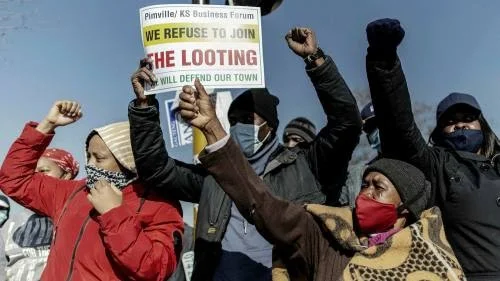‘We are on the verge of eating each other’ – South Africans reel from riots
As South Africa’s worst public violence in decades swept Johannesburg and its biggest township this week, Nhlanhla Lux was ready to defend the shopping centre he called Soweto’s “last elephant” with his life.
Clad in camouflage and armed with a pistol, the 33-year-old community leader guarded the closed gates of Soweto’s Maponya mall with a handful of police and soldiers on Wednesday, a last line of defence against rioting that has left more than 70 dead and devastated Africa’s most industrialised economy. Two hundred other malls like Maponya have been looted in affected areas, according to business leaders.
“We can’t sit back while the township economy dilapidates further,” said Lux. “The biggest mall, that employs the biggest number of people, is the one left standing. If it falls, it’s the last elephant.”
In the past few days, South Africa has come closer to social breakdown than at any point since the end of apartheid almost three decades ago. Such scenes of violence have “rarely [been] seen before in the history of our democracy”, President Cyril Ramaphosa said on Monday. For Lux, it is clear what is at stake. “I for one am prepared to die” to halt the unrest, he said. “We are on the verge of eating each other.”

The immediate trigger for the unrest was the jailing last week of Jacob Zuma, the former president, for failing to attend an inquiry into corruption during his nine-year rule. What started as sporadic protests, egged on by Zuma’s supporters, escalated on Monday when mass rioting convulsed two of the most populous and economically important provinces: KwaZulu-Natal, Zuma’s home state and power base, and Gauteng, which includes Johannesburg and Soweto.
After months of lockdowns and amid a devastating third Covid wave, tensions have come to a boil. As cities are trawled by gangs of looters, motorways and vital economic arteries have shut, as have vaccination centres and businesses. Warehouses in Durban, Africa’s biggest port, have been burnt and looted. With overwhelmed police often standing by doing nothing, Ramaphosa ordered 2,500 troops on to the streets. Late on Wednesday, the defence ministry called up thousands more, in what is set to be the biggest deployment since the end of apartheid in 1994.
Zuma’s jailing was hailed as a victory for the rule of law in South Africa, and for Ramaphosa as he sought to combat graft in the ruling African National Congress and to unify its warring factions. But the ensuing chaos — and the security forces’ struggle to gain control — has fanned criticism of the ruling party for presiding over years of institutional decay and its failure to tackle inequality.
Even before Ramaphosa imposed harsh lockdown restrictions, joblessness at the start of 2021 stood at nearly a third and it is much higher for young people. Long before the pandemic, the economy was flatlining in per capita terms because of a faster-growing population. Destruction in KwaZulu-Natal could set the local economy back further, analysts say. Fuel and food shortages loom as supermarkets and a big refinery have shut in Durban.
“It is a war zone . . . towns deserted, shops looted, bodies lying on the road,” said John Steenhuisen, leader of the main opposition Democratic Alliance, in the province. “We have an internal ANC battle that has spilled over on to the streets of KwaZulu-Natal . . . the initiative has been completely lost by the security services”. They need urgent reinforcement.
Critics charge that Ramaphosa was slow to deploy the army. Analysts also say that the state’s response has been undermined by a decade of decay in police and intelligence services that, like other institutions, were hollowed out under Zuma’s rule.
“Institutions like the police crime intelligence unit were taken over by Zuma acolytes,” and used to hound his political opponents during his presidency, said Ziyanda Stuurman, a security analyst and author.
This week, the government admitted that former security agents loyal to Zuma might have instigated the initial unrest, although analysts agree that criminals have since taken advantage of the looting.

A social safety net that grew threadbare through successive lockdowns also means that “the ground is fertile and ripe for chaos, violence, and looting,” Stuurman added. The decision by the Treasury to stop an emergency 350-rand ($24) monthly grant for the jobless in April has made things worse. “A dedication to austerity at this point in time is absolutely not going to get us through the next few months,” Stuurman said.
“This all began with ANC factionalism,” she added, referring to the rival supporters of Zuma and Ramaphosa. But, “at the end of the day, and in the most unequal country in the world, there were always going to be people who felt that they had nothing to lose.”
In Soweto, the signs of destruction were many. At Protea Gardens, a ruined mall in another part of the township, debris spilled out of smashed stores and an ATM had been ripped from the wall.
Criminals broke in and took what they wanted first, but then the “whole community” joined in, said Tshepo Mabilo, the owner of a security firm guarding one of the few untouched shops. “It’s not about Jacob Zuma. It’s criminal,” he said.
“People are hungry because of this lockdown and unemployment,” Mabilo said. “It is so sad. Half of the community rely on this mall, in terms of jobs, groceries, and banking . . . we don’t know what is going to happen.”
(Financial Times)


